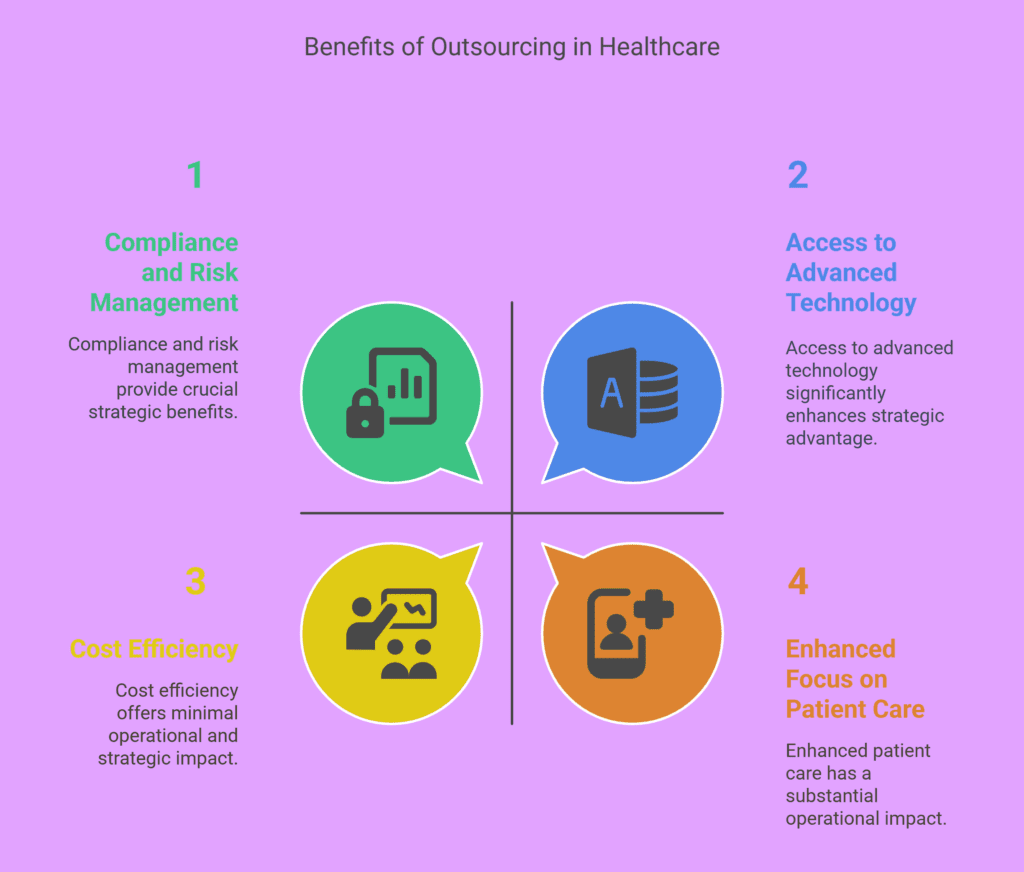Healthcare BPO Market Growth: What It Means for Small and Mid-Sized Practices
01 Jul 2025 By: Maria Rush
Updated
The healthcare BPO market is the growing network of outsourcing partners that handle back-office work for medical practices, such as billing, coding, claims, scheduling, and patient calls. It matters because clinics face more paperwork, tighter compliance, and staffing gaps. For example, a small practice can outsource insurance verification and reminders to reduce admin load and keep patients moving through care.

Understanding Healthcare BPO
So, what is healthcare BPO, really? Think of it as getting help with the stuff that takes up way too much time. This include billing, coding, scheduling, patient calls, and all the admin work that piles up. Instead of juggling it all in-house, you can hand these tasks off to a team that’s built for it. That way, your people can do what they do best: care for patients.
The Rise of Healthcare BPO
Why’s everyone talking about BPO all of a sudden? Because keeping up with healthcare today is hard. There’s more paperwork, more tech, more pressure to be efficient and smaller practices are feeling it. At the same time, tools like telehealth and EHRs are making outsourcing even easier. So more and more practices are turning to BPO to lighten the load.
Key Services Offered
Here’s what practices are actually outsourcing:
- Billing and coding
- Claims processing
- Appointment scheduling
- Telehealth support
- Insurance verification
All of these free up your time, reduce headaches, and help things run smoother. Many BPO providers also use automation and analytics to boost accuracy and speed. Less time chasing payments, more time with patients.
And don’t underestimate the power of data. With the right partner, you can get insights into your operations that help you make better decisions without needing a whole analytics department. This type of insight is a growing area of focus in outsourcing market research.
Healthcare BPO Market Statistics and Growth Forecasts
Just how big is this getting? According to Precedence Research, the healthcare BPO market size is expected to grow from 466.6 billion USD in 2025 to over 1 trillion USD by 2034. That’s a huge jump.
Zion Market Research has similar numbers: from USD 392.4 billion in 2024 to nearly USD 985 billion by 2034. This reflects the growing influence of the overall healthcare BPO market within the global BPO industry.
The healthcare BPO industry isn’t just expanding, it’s evolving. And small to mid-sized practices are finally able to access services that used to be reserved for hospitals with massive budgets.
Healthcare BPO Market: Regional Insights
In the field of healthcare BPO, North America remains the dominant player, representing almost 49% of global market revenue in 2024.
Asia-Pacific is undoubtedly the hottest spot for growth, especially in the case of India and the Philippines, where the combination of skilled workers and low wages makes outsourcing a wise decision for foreign healthcare companies.
Europe, Latin America, the Middle East, and Africa, however, are also progressing, but their shares of the market are still quite small at this point in time.
This global growth means that even small medical offices can have a choice of a wider range of services, enjoy better prices and get support around the clock no matter where they are located.
Trending Now
The Philippines’ healthcare BPO market is booming and U.S. businesses are starting to take notice. At a recent event in New York, the DTI’s Trade Commissioner Benedict Uy encouraged Filipino-American healthcare providers to explore outsourcing to the country. Highlighting its strong compliance standards and investor incentives. With over $4 billion in value and 9% annual growth, healthcare BPO is now the fastest-growing part of the Philippines’ $38 billion BPO industry. And it just secured $79 million in deals at the 2025 HIMSS conference.
What are the Benefits of BPO for Small and Mid-Sized Practices?
Cost Efficiency
It costs a lot of money to hire and train administrative personnel. Outsourcing allows you to use expert support with no additional costs involved. Moreover, since these groups concentrate solely on the respective functions, they are generally faster and more precise, too.
Enhanced Focus on Patient Care
Less admin work means more energy for patients. Whether it’s following up, personalizing care, or just having time to really listen, every minute counts.
Access to Advanced Technology
Don’t have the budget for fancy new tools? Most BPO partners do. That means you get access to the latest systems without having to invest in them yourself.
Scalability and Flexibility
Need more help during busy seasons? Want to cut back during slow periods? BPO gives you the ability to flex your team without hiring or firing.
Compliance and Risk Management
Let’s be real, keeping up with HIPAA and data security is a full-time job. A good BPO partner handles all of that for you, so you can breathe a little easier.

What are the Challenges of Implementing BPO?
Naturally, everything is not perfect. There are some points that need to be considered:
Data Security and Compliance
In fact, you are giving a third party access to very private patient information. Therefore, it is very important that you partner is HIPAA compliant and privacy policies are very strict.
What is Quality Control?
Delegating tasks doesn’t mean giving up on the whole thing. It is necessary to set expectations from the start, follow up on how things are going, and be present all the time.
Integration with Existing Systems
Are you contemplating outsourcing? Let us give you some tips on preparing for the best outcome:
Strategizing for Successful BPO Implementation
If you are seriously thinking about BPO, the following steps will help in your implementation process planning:
Conducting a Needs Assessment
Is it possible to list the areas where help is needed? The answer is no if you plan to outsource just for the sake of it. The problems should be ranked and then one should be picked.
How to Choose the Right BPO Partner?
Look for experts with previous experience in the healthcare sector. There are certain things you should look for such as excellent ratings, top-notch security, and efficient communication. It wouldn’t be wrong to say that you should have a partner, not just a supplier. Moreover, being in tune with the veterinary practice market trends can help you find such outsourcing partners who are knowledgeable about the specific challenges and opportunities of the industry.
Establishing Clear Communication Protocols
Informed people are the best to make decisions. The regular meetings, the common objectives, and the feedback are the things that help keep the process smooth.
The Future of Healthcare BPO Market

The BPO industry isn’t just growing, it’s getting smarter. Here’s what’s coming:
Emerging Technologies
AI and automation are speeding things up and reducing errors. What used to take hours now takes minutes. According to Coherent Market Insights, the healthcare IT outsourcing market alone is projected to grow at over 7.3% CAGR.
Increased Focus on Patient Experience
Patients expect better service fast. BPO can help you meet those expectations, from quick follow-ups to smooth online scheduling.
Regulatory Changes
Ongoing changes in healthcare regulations will also impact the BPO market. A good BPO partner keeps you compliant without you having to read every single policy update.
Conclusion
The healthcare BPO market is growing and for good reason. For small and mid-sized practices, it’s a smart way to save time, reduce stress, and stay competitive.
This isn’t just for big hospitals anymore. With the right partner and a little planning, outsourcing could be the thing that helps your practice grow without burning out your team. And in today’s world, that’s a win worth exploring.
Want to explore what BPO could look like for your practice? Talk to us today. No pressure, just a conversation. Let’s find out if HelpSquad Health is the right fit to support your team.
What is healthcare BPO for small and medium-sized practices?
Healthcare BPO for small and medium-sized practices is the outsourcing of all the tedious back-office jobs, such as billing, coding, claims, appointment setting, patient calls, and insurance verification, to an external team of specialists. The in-house doctors and medical staff devote more time to the patients as they have been liberated from attending to the paperwork and other administrative matters.
What is the main reason behind the swift expansion of the healthcare BPO market?
The healthcare BPO market has been growing very rapidly mainly due to the increasing difficulty of managing medical practice: compliance with the new laws, technology adoption, decreased profit, and the higher demands of patients are all factors this market faces. At the same time, telemedicine and EHR adoption have made it a situation where outsourcing is secure and efficient. BPO has turned out to be a competitive necessity for a number of smaller practices as it has moved from “nice to have” to practical in keeping them patient-centered and serving the market.
What are the common functions that healthcare BPO providers carry out?
Healthcare BPO providers typically handle the management of activities related to billing and coding, claims processing, pre-authorizations, insurance verifications, appointment setting and reminders, telehealth support, and patient calls, among others. Besides, many providers have analytics and reporting to offer, which enable practices to gain insights into their collections, denials, and patient flow trends without having to hire their own data team.
What is the present state of the healthcare BPO market and what is its future growth rate?
According to the study cited in the article, the healthcare BPO market has already attained an outstanding value of hundreds of billions of dollars and will most likely cross the trillion-dollar USD mark in the early 2030s. Forecasts from analysts like Precedence Research and Zion Market Research suggest a slow but steady growth trend at the rate of double-digit or high single-digit percentages, and this is the extent to which outsourcing has become an inherent part of the healthcare sector worldwide.
What do small and medium practices gain the most from the use of healthcare BPO?
The most important benefits are reduced operational costs (no need for recruiting and training a big in-house admin team), more time for taking care of patients, access to better tools and automation, and the possibility of scaling support according to the demand. A trustworthy BPO partner also simplifies compliance, risk management, and faster, more accurate revenue cycle performance.


